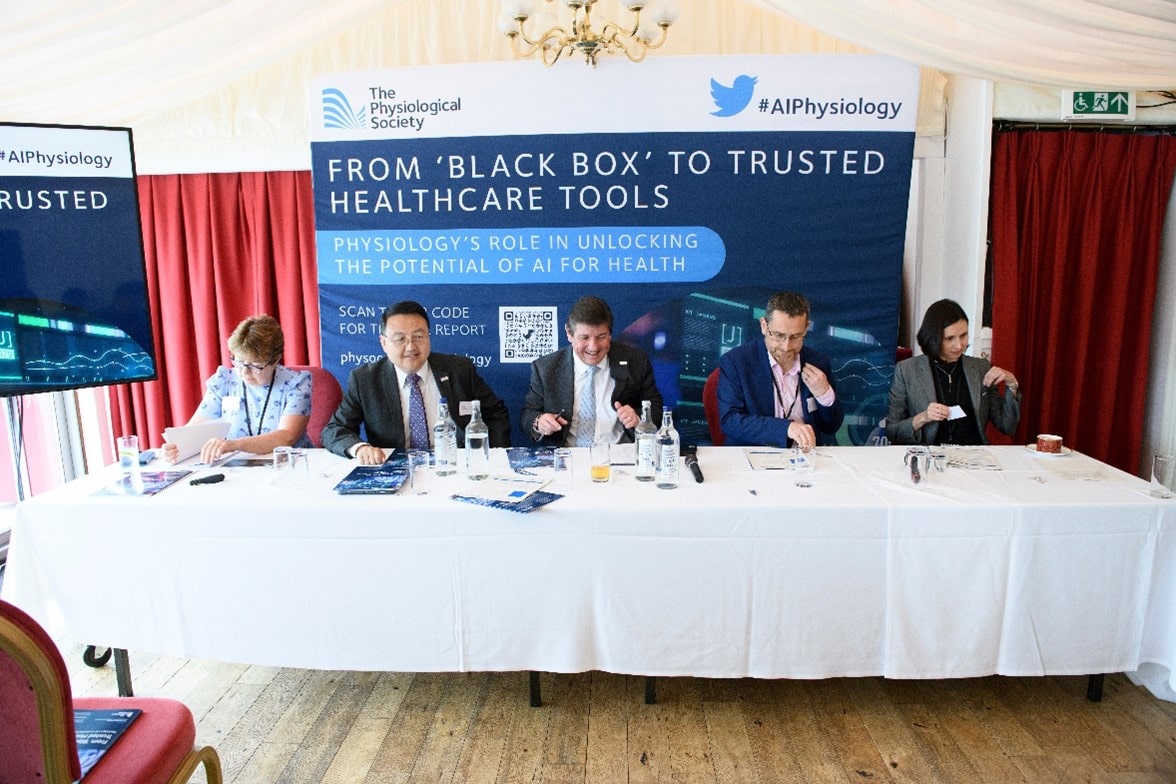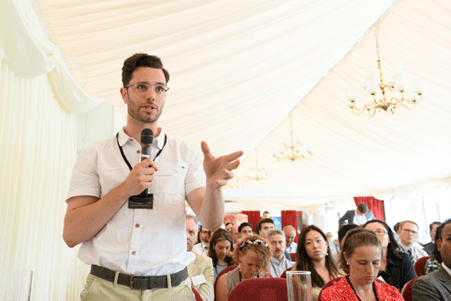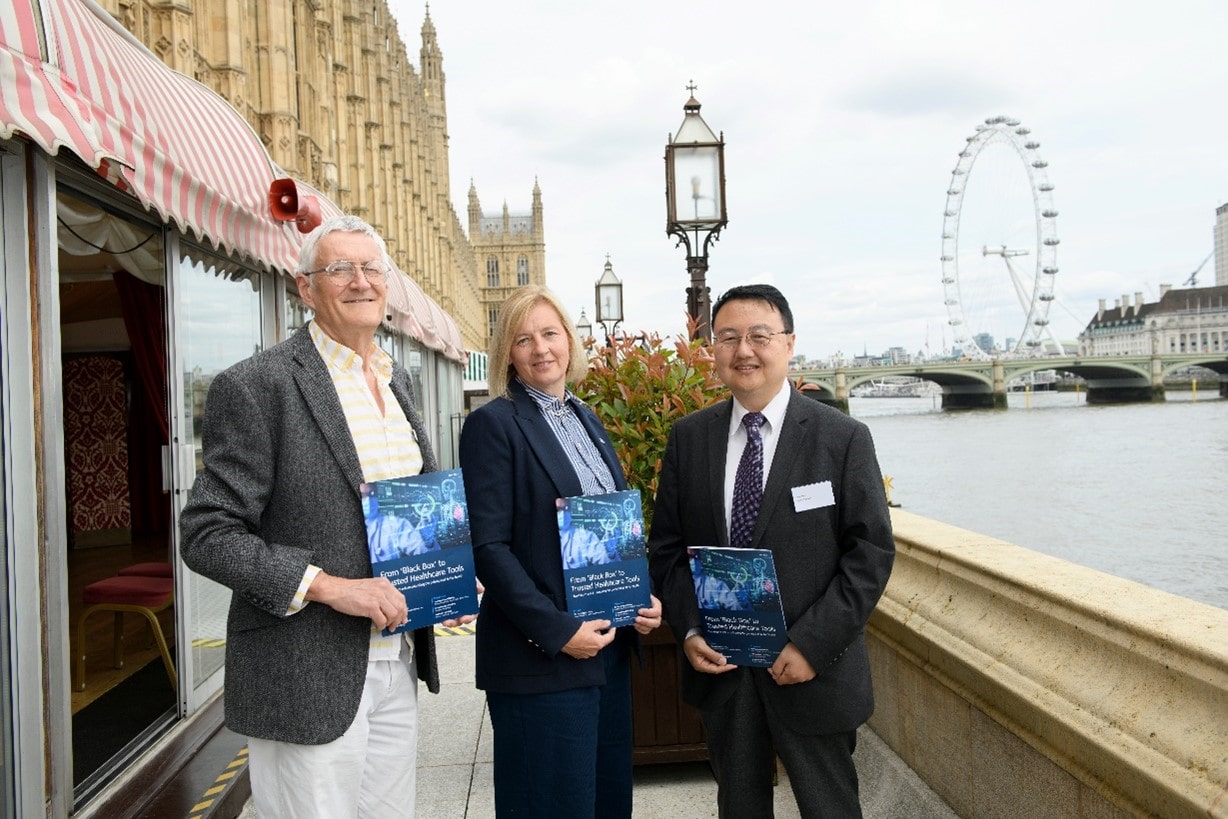
Physiology News Magazine
From Black Box to Trusted Healthcare Tools: Physiology’s Role in Unlocking the Potential of AI for Health
Policy Focus
News and Views
From Black Box to Trusted Healthcare Tools: Physiology’s Role in Unlocking the Potential of AI for Health
Policy Focus
News and Views
https://doi.org/10.36866/pn.131.8
Shania Pande
Policy Officer, The Physiological Society
The potential for AI in healthcare
The UK health system is under ever-increasing pressure due to public health challenges such as a growing and ageing population coupled with an overburdened NHS. The Office for National Statistics estimates that by 2045 4.3% of the country’s population (3.1 million people) will be aged 85 years and over. This significant demographic shift means that we must ensure the health system is fit for the future by rapidly diagnosing disease and preventing ill health.

Artificial intelligence (AI) and machine-learning technologies are already being used to improve health outcomes. For example, data from patient-monitoring devices collecting physiological measurements such as heart rate, blood pressure and oxygen saturation are being used to personalise care; similarly, data on sleep quality can be used to suggest behavioural changes.
The UK’s political leadership has also recognised that AI technologies present opportunities to support the NHS, with the Government announcing that they will host a summit in the autumn to consider the risks of AI and how they can be mitigated, as well as discuss a global coordinated approach with other countries.
However, work in AI tends to happen in silos. Since healthcare is a vast field, encompassing numerous specialties and sub-specialties, AI developers tend to focus on specific areas of expertise, leading to the creation of specialised tools that only address specific medical conditions or processes. There is a need for cross-disciplinary collaboration to enhance our understanding of, and trust in, the results generated by AI technology, which is often seen as a ‘black box’.

Physiology and AI
Physiological knowledge is essential to lifting the lid on this ‘black box’ to improve AI algorithms. Physiology can provide insight into the underlying biological processes and mechanisms that drive various health conditions. This domain knowledge can help inform the development of AI algorithms and ensure that they accurately model the plausible physiological processes and reduce risk of identifying confounding factors. Further, physiologists can interpret and contextualise the data used to train AI models, ensuring that they contain plausible measurements and are representative against known standards for the target end users.
To this end, The Society recently launched our report “From ‘Black Box” to Trusted Healthcare Tools’ in Parliament. The report found that Grouplimited inclusion of physiological evidence in the development of AI tools can lead to reduced trust, challenges with applicability and, at worst, to the identification of spurious correlations without sufficient physiological plausibility.
The event, kindly hosted by Viscount Stansgate, brought together physiologists, doctors, healthcare professionals and as well as representatives from industry. The panel featured AI, healthcare, and policy experts. We heard speeches from Stephen Metcalfe MP (Chair of the All-Party Parliamentary Group on AI); Dr Richard Siow from King’s College London and The Physiological Society; Svitlana Surodina, also from King’s College London; Michael Ball from the Medical Research Council; and Katrina Payne from The Alan Turing Institute. The discussion that followed highlighted the need for physiologists to work alongside AI experts to develop AI tools that accurately model plausible physiological processes and reduce the risk of identifying confounding factors.

AI summit on physiological plausibility
As such, The Physiological Society is committed to collaborating with all stakeholders involved in designing, regulating, and implementing AI tools in healthcare.
By the end of 2023, The Society commits to:
- support the development and adoption of principles and success criteria that describe physiologically plausible technological applications to clarify AI’s “black box”.
- initiate a forum to facilitate regular discussions between physiologists and other key stakeholders to achieve a shared understanding of physiological plausibility and the opportunities and risks associated with AI tools in healthcare.
- begin to outline and deliver a training programme for physiologists, developers and data scientists to establish a shared language and understanding for building physiologically plausible technology by design.
In the coming months, The Society will be working closely with members and experts at the AI and health nexus to take forward the recommendations from the report and develop a set of principles and success criteria that describe physiologically plausible technological applications. If you are interested in being involved in these next steps please email us at policy@physoc.org.
Further information about this report and our policy work can be found at physoc.org/policy

